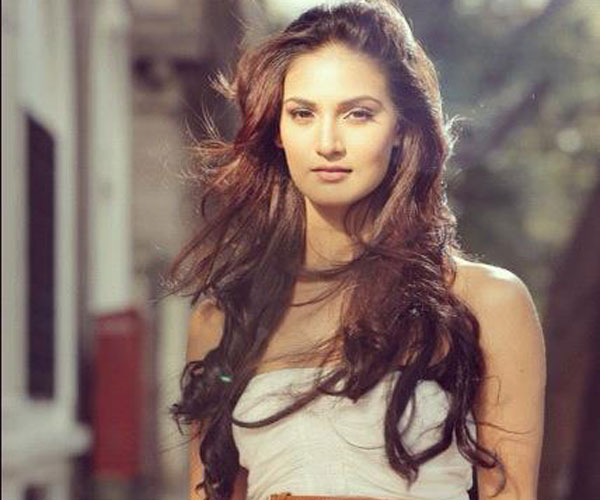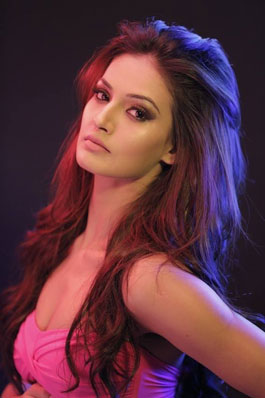The Absolute Artiste - Mukti Mohan

She gave us some of the most breathtaking performances in Jhalak Dikkhla Jaa but Mukti Mohan wants to be an actress first and then a dancer. “I definitely enjoy dancing but I am more comfortable acting” she admits to me. Born into a family of talented and gorgeous sisters, Mukti is determined to follow her passion and be her own person. A dancer is the embodiment of mental and physical strength but an actor is required to reach in and let the whole world see their vulnerabilities. Through her performances, Mukti can be graceful, beautiful, calm, shy, edgy, fresh and extremely strong…Tinsel Gupshup brings you Mukti Mohan – the Absolute Artiste
TG: Out of all dance forms…what got you interested in contemporary?
MM: You know when I was a kid, I used to love telling stories and I would use expressions and my body language to explain things. I learned Bharatnatyam for 10 years and it is a very strict dance form. It has certain norms, certain postures, mudras and you have to follow those strictly. Honestly speaking, I never enjoyed dance as much as I enjoyed acting because when you act you can take any route to make the viewers believe in your character. Even as a kid, I used to believe in the stories I was narrating and that is one of the best qualities for an actor to have…to be able to feel and believe. I feel that contemporary dance allows a dancer some freedom because you can mould each movement to your emotions. So, as an actor, I prefer contemporary because there is a flow in the movements and you can use the body to express your feelings.
TG: I have read that Ballet and Contemporary are probably one of the hardest forms of dance…do you suffer for your art?
MM: You know, it’s not just Ballet or Contemporary…I feel that that any dance or art form requires you to be a little…psycho!! If you want to be perfect then you have to push yourself. Having said that, I also believe that if you are passionate about the art then no matter how hard you push yourself, you will not feel unhappy or frustrated. If you are not happy about what you doing, if you feel pressured by the competition then things start turning negative. During Jhalak Dikhhla Jaa (JDJ), I did not sleep for months because I was in the face-off competition every single week. So I had to work really hard and rehearse for hours. From the 1st day on Jhalak, I had 3 performances in 4 days and we used to literally go to sleep on the rehearsal floor, decide that we will wake up in 2 hours and rehearse again. We used to dance non-stop for 14 hours at a stretch…it was insane but I loved every single second! I have never mentioned this to anyone but I’ll let you in on this…while rehearsing for my wild card entry performance, I had injured my upper rib. Once I injured it, the pain was excruciating and I felt that pain every single second. So, in order to perform, the bone had to be pulled up with tape and that was the only way I could dance. Initially, my partner on Jhalak was this really rough and tough guy and he is an amazing dancer but every time he had to lift me and put me down…it was rough. He was like this ‘akhaade’ ka guy and he would say ‘Jai Bajrang Bali’ while picking me up and then plop me down. So within 10 days I had injured my ribs and that injury stayed for 3 months. The doctor told me I had to rest but there was no way I could do that because of the show. So I was going through physiotherapy but I did not share this with anyone during the show. Everyone talks about their injuries but I felt that Jhalak was such an exciting phase and I really did not want my injury to become a dark cloud over my performances. I wanted people to see my hard work and the fact that I was really enjoying performing. I wanted people to see the positive side of Mukti.

TG: In a show like Jhalak, do you think it is fair that the fate of a contestant is decided by audience votes rather that the scores given by the judges? You could be a brilliant strong and graceful dancer but popularity is more important?
MM: I don’t know if it is fair or unfair…I mean we live in a democracy so people can vote for whoever they like. At the end of the day, it is a competition and you have to be prepared for the fact that a dancer can never win a dancing show. For example, a show like ‘Dancing with the Stars’ you watch the journey of a non-dancer who works hard, shows tremendous improvement and goes on to become a good dancer and win the show. When I participated in Jhalak, winning was not the ultimate goal for me. I wanted to give memorable performances, push myself and narrate as many stories through my dance. Even a fabulous dancer like Lauren got the maximum number of 30’s but she did not win the show. You know, I used to enjoy being the face-off round because every week we would be in face-off and every single week we would work so hard, perform well in face-off and move on to the next round. But in the end they removed the face-off round and I was really upset. I feel like my journey in Jhalak is incomplete because I was waiting for the opportunity to perform in the last face-off…you know…give that one final face-off performance and win it! I was quite disappointed when we had only two episodes of Jhalak left and they decided to remove face-off.
TG: What is your favourite form of dance…something you would love to take time out to learn?
MM: Ummmm…my dad always wanted me to learn Kathak. I have learned Bharatnatyam and my dad always felt that it is a very loud dance form. He always says that there is no flow or ‘nazaakat’ in Bharatnatyam and I did not give it much thought when I was younger but now I really do want to learn Kathak. I started learning Bharatnatyam in school and my teacher was an inspiration because she would go into the history of the dance and I just loved learning about all the different facets of the dance. When I was in Jhalak, Madhuri ma’am called me and told me that I was a really graceful dancer and that I should learn Kathak. It was an unforgettable moment because I grew up watching Madhuri ma’am and Sridevi…trying to dance like them. So at Jhalak, I was sitting in the audience and Madhuri ma’am called me to give me advice…I was so nervous…I was shaking!

TG: Are there any dancers or choreographers that have inspired you?
MM: I had joined Ashley Lobo’s dance class for a month and that was the time I started realizing that I could actually dance. I was doing splits and trying out different dance moves and beginning to see my flexibility. Before that, I did not know that I could do all these things! So Ashley would come to some of our classes and he is obviously an established guru of dance. He would talk to us about posture, grace, strength…basically one of the things he said was that if you are a dancer then even when you are doing household chores…you should look like a dancer! Your body language should show that you are a dancer. Those words stuck with me. So for example, when I do a split…I make sure that when I finish…I maintain the pose. You can’t just do a step and not finish it and even when you finish the step, it needs to look polished and graceful. Even if you are not a formally trained artist, if you are passionate and keen to learn, you will grasp things and learn from them. I have seen Shakti rehearse at home continuously and she would teach me and tell me to try this or try that, hold the pose longer and she would keep correcting me. You know, a lot of people feel that dancing is about grace or that dancing is about flexibility but actually it is a combination of a lot of things. I have seen dancers who can do a beautiful split but they don’t have the strength to maintain it. So as a dancer you need strength, you need flow and you need to feel the beat.
TG: Dancing for the camera vs. a live audience…which would you prefer? Why?
MM: Both! I don’t like shooting for a song. I like performing and you capture the performance in one go. If you break it in chunks, it is very difficult to remember what you did in the last shot because in between shots thousands of people will come to you to paint your face, do your hair etc and that distracts you from the moment. Then the director goes – ‘AGAIN…’and you have to remember what you did in the last shot, remember the expression you had maintained…keep all that in mind and continue.

TG: What qualities do you need to become a good dancer? Can a good dancer also become a good choreographer?
MM: Hmmm…actually there are three things. There are dancers, there are teachers and there are choreographers. A film choreographer is very different from a stage choreographer. A stage choreographer will cover space while a film choreographer will use costumes, light, props etc to show a dance sequence in a box. I believe that a dancer will always be a dancer and if you understand space and have knowledge of the camera…a dancer could become a choreographer.
With regards to the qualities, a dancer should have that hunger to learn. You can’t become a good dancer by going to a class, learning some steps, coming back home and going about your regular day. Dance requires constant rehearsals. You know anyone can teach you a movement but it is how you take that movement, add emotion to it and adapt it to make it an extension of your own body…that defines a good dancer. When I look back at Jhalak, I am surprised at all the stuff I did because even now…I am learning and I am still not aware of all the things I am capable of. When I dance, I literally become the beat.

TG: What kind of a dancer impresses you?
MM: I think finesse is very important for a dancer. You know, when you watch someone dance…you should not see the movements as 5-6-7-8. There should be flow and when you listen to the music and see the person dance…you should not be able to differentiate between the rhythms, the dancer, the movements…it should all just fall in place.

TG: Dancing, choreography, acting…what do you prefer?
MM: I prefer acting! I have taken a lot of acting workshops, done theatre and acting is my first love. You know, in theatre you can modulate your voice or use certain techniques and you are in front of a live audience…I find that very exciting. On the other hand, acting in a movie you are just as big as a 70mm screen…people get to watch your expressions, hear your voice in that larger than life sphere. So acting in movies has its own set of nuances that I find very challenging. Right now I am busy with shows and performances but I am waiting for a big project and if everything works out…then you will see me on screen soon…fingers crossed!
Photo Credit: Mukti Mohan
©Tinsel Gupshup



